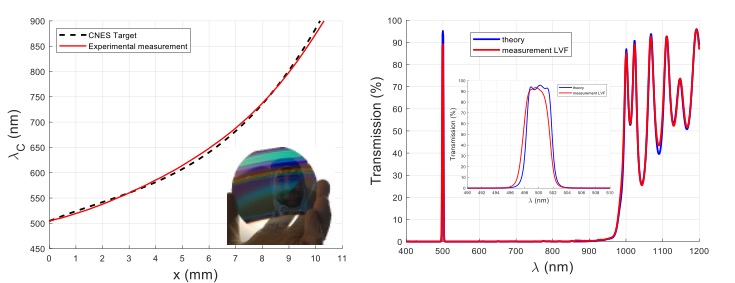In the framework of several research and technology (R&T) projects funded by the Centre National d’Etudes Spatiales (CNES), the RCMO team has developed a technology for the fabrication of variable filters based on the Bühler HELIOS (plasma-assisted magnetron sputtering) machine. This technology is based on the use of gradient masks allowing to locally control the deposited thickness along one of the directions of the substrate on which the filter is deposited. Due to the high stability of the deposition conditions provided by the machine and the precise control of the deposited thicknesses by in-situ optical monitoring techniques, it is possible to realize variable complex stacks with performances similar to those obtained with uniform filters.
A first phase of this project aimed at developing filters for the sensitivity band of silicon detectors (400-1100 nm) and allowed testing the technology and realizing first prototypes. It also allowed demonstrating that the shape of the gradient could be controlled (linear or non-linear) and to quantify the limits of the method. A new phase currently in progress should allow to demonstrate that this technology can be applied to other spectral domains and in particular to the 900-2500 nm band. The final objective of these studies is to provide the space agencies with very high-performance filters that can be integrated on imagers for the realization of compact spectro-imagers.

Example of a non-linearly variable filter. On the left, the wavelength gradient on the surface according to the chosen x-direction and on the right the optical performance of the filter centered at 500 nm.
Collaborators: Bühler/Leybold Optics
Fundings: CNES
Contacts: Frédéric Lemarquis/Julien Lumeau


 ResearchGate
ResearchGate Flux RSS
Flux RSS